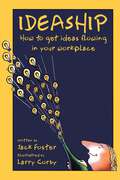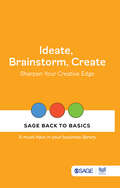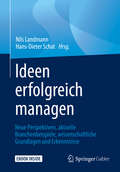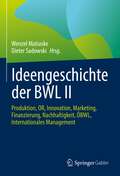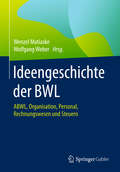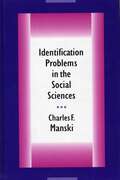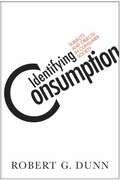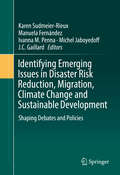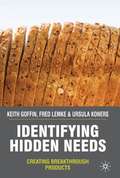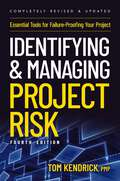- Table View
- List View
Ideaship: How to Get Ideas Flowing in Your Workplace
by Jack FosterInnovative, original ideas are a company's most powerful competitive advantage. Nathan Mhyrvold, former chief technology officer at Microsoft, has said that a great employee is worth 1,000 times more than an average one simply because of his or her ideas. In Ideaship, the sequel to his bestselling book, How to Get Ideas, Jack Foster shifts from how individuals spark their new ideas to how to unleash the creative genius of an entire organization. To create an idea-prone workforce, Foster proposes a totally new concept of leadership: "ideaship." Leaders shouldn't be spending their time obsessing over profits or sales or quality or service. Instead, they should devote most of their energies to making the office a place where creative ideas flow, where the workforce truly believes in its ability to brilliantly solve any problem put before it. Above all, where it's fun to work. With energy and humor, Foster draws on over thirty-five years as creative director of major advertising agencies-organizations whose only purpose is to constantly generate ideas-to offer dozens of fun, fast, often surprising nuggets of practical advice on how to create an environment where innovation and fresh thinking thrive. He reveals why you should only hire people you like, insist employees take vacations whether they want to or not, why efficiency is sometimes inefficient, and how sometimes you can accomplish more by playing the fool instead of the capital L "Leader." Ideaship spells out proven ways to encourage creativity, simply and clearly and cogently, without a lot of charts and graphs and formulas and acronyms and statistics and fillers. It flips traditional leadership on its head and shows how simple acts of compassion, trust, and generosity of spirit, as well as some seemingly zany actions, can unleash unexpected, vital bursts of creativity.
Ideate, Brainstorm, Create: Sharpen Your Creative Edge (SAGE Back to Basics)
by SAGE Publications India Pvt. LtdCreativity is the heart of innovation and the soft skill that makes us better and smarter than our fellow nemesis—Artificial Intelligence. The book is the retelling of ideation, brainstorming, creativity tips and best practices which if used judiciously can work wonders for business professionals. Ideate, Brainstorm, Create is for all practitioners who are looking to grow their talent and skills to be remarkable in their daily jobs. SAGE Back to Basics is a distilled compilation of proven and timeless ideas and best practices for new-age and experienced leaders alike. The hand-picked collection of books—on management, leadership, entrepreneurship, branding and CSR—offer advice from management experts whose knowledge and research has impacted and shaped business and management education. Other books in the series: Timeless Leadership | Advertising and Branding Basics | Leadership Lessons from Dr Pritam Singh | Corporate Social Responsibility in India | Basics of Entrepreneurship | Human Resource Development Insights | Building Professional Competencies | Timeless Management | Soft Skills for Workplace Success
Ideen Für Passive Einkommen: 50 Wege um Online Geld Zu Machen Analysiert
by Michael EzeanakaViele Menschen machen den Fehler, passives Einkommen mit dem schnellen Geld gleichzusetzen. Ich hoffe, dass Sie nicht denselben Fehler machen. Aus diesem Grund habe ich diesen Leitfaden über die gängigsten Möglichkeiten, passives Einkommen zu erzielen, zusammengestellt. Meine Absicht ist es, Ihnen bei der Entscheidung zu helfen, ob eine Gelegenheit für Sie geeignet ist oder nicht. Ich möchte Ihnen auch dabei helfen, die Mythen und Missverständnisse rund um diese einkommensschaffenden Methoden zu entlarven. Die Informationen und Analysen, die Sie in diesem Buch finden, beruhen auf Fakten und beobachtbaren Trends. Ich möchte sicherstellen, dass Sie auf dem richtigen Weg sind, wenn Sie sich schließlich entscheiden, einen Weg zu finden, passives Einkommen zu generieren.
Ideen erfolgreich managen: Neue Perspektiven, aktuelle Branchenbeispiele, wissenschaftliche Grundlagen und Erkenntnisse
by Hans-Dieter Schat Nils LandmannDas Praxishandbuch Ideen-Management stellt die neuesten Erkenntnisse zum Management von Ideen aus wissenschaftlicher Sicht dar. Die Beiträge aus der Forschung werden durch Best Practices von Organisationen, die aktuell im Ideenmanagement besonders herausragen, ergänzt.Die Beiträge aus der Forschung vereinen erstmalig die führenden Wissenschaftler zum Ideenmanagement im deutschsprachigen Raum. Sie geben Praktikern, Wissenschaftlern und Studierenden einen einmaligen Überblick über den aktuellen Stand der Forschung zum Thema.Mit Beiträgen von- Prof. Dr. Alexander Brem: Ideen- und Innovations-Management- Prof. Dr. Dr h.c. mult. Norbert Thom: Ideen-Management – Abriss der Forschung- Prof. Dr. Swetlana Franken: Diversity im Ideen-Management- Prof. Dr. Thomas Mühlbradt: Herausforderungen des Ideen-Managements in neuen Arbeitswelten- Prof. Dr. Hans-Dieter Schat: Benchmarks und Kennzahlen im Ideen-ManagementIm Praxisteil liefern Best-Practices aus den unterschiedlichsten Branchen wie der Automobilwirtschaft, Chemie, Banken und Versicherungen, Behörden, Gesundheitswesen, Handwerk u.v.m. wertvolle Einblicke, wie ein Ideen-Management erfolgreich aufgesetzt, betrieben und aufrechterhalten werden kann.
Ideengeschichte der BWL II: Produktion, OR, Innovation, Marketing, Finanzierung, Nachhaltigkeit, ÖBWL, Internationales Management
by Wenzel Matiaske Dieter SadowskiDie Betriebswirtschaftslehre hat in der jüngeren Vergangenheit kein allzu großes Interesse an der eigenen ideengeschichtlichen Entwicklung gezeigt. Dafür gibt es verschiedene Gründe wie das enorme Wachstum des Faches und die erfolgreiche Internationalisierung, was wenig Zeit für rückblickende Selbstvergewisserung und Raum zur Entfaltung der disziplinären Eigenständigkeit im multidisziplinären Umfeld ließ. Selbstvergessenheit ob der eigenen Disziplin führt allerdings nicht nur dazu, dass eine Disziplin Problemlösungen häufiger erneut erfindet statt an vorhandenen Ansätzen anzuknüpfen, sondern birgt vor allem auch die Gefahr, dass die konstituierenden Probleme und Fragestellungen verloren gehen.In der deutschsprachigen Betriebswirtschaftslehre besteht deshalb seit einigen Jahren das wieder entfachte Interesse und Bemühen, wichtige Beiträge zu der Ideengeschichte der Betriebswirtschaftslehre und den Wurzeln des Faches in das wissenschaftliche Bewusstsein zu rücken. Dieses Buch leistet dazu einen wichtigen Beitrag. Es setzt die Diskussion fort und konzentriert sich auf die Gebiete Produktion, Operations Research, Innovation, Marketing, Finanzierung, Nachhaltigkeits-Management, Öffentliche BWL, Nonprofit- und Internationales Management.Die Autoren identifizieren und diskutieren markante Ideen und Beiträge zur Entwicklung des Faches. Neben dem Blick zurück wird auch der aktuelle Zustand des Faches betrachtet. Auf dieser Grundlage werden denkbare weitere Entwicklungslinien von den Autoren abgeleitet.
Ideengeschichte der BWL: ABWL, Organisation, Personal, Rechnungswesen und Steuern
by Wolfgang Weber Wenzel MatiaskeDieses Buch erläutert und entwickelt das Profil der Betriebswirtschaftslehre weiter und liefert wichtige Beiträge zur Ideengeschichte der Betriebswirtschaftslehre. Das Buch konzentriert sich dabei insbesondere auf die Gebiete Organisation, Personal, Rechnungswesen, Steuern und Allgemeine Betriebswirtschaftslehre. Gegenwärtig zeichnet sich die Möglichkeit ab, dass sich die fachlichen Teilgebiete der Betriebswirtschaftslehre verselbständigen. Dazu trägt auch, aber nicht nur, das mittlerweile weltweit dominierende angelsächsische Verständnis des Faches bei, das durch eine weitgehende Zersplitterung der betriebswirtschaftlichen Teilgebiete gekennzeichnet werden kann. In der deutschsprachigen Betriebswirtschaftslehre besteht deshalb seit einigen Jahren das wieder entfachte Interesse und Bemühen, wichtige Beiträge zu der Ideengeschichte der Betriebswirtschaftslehre und den Wurzeln des Faches in das wissenschaftliche Bewusstsein zu rücken. Dieses Buch leistet dazu einen wichtigen Beitrag. Die Autoren identifizieren und diskutieren markante Ideen und Beiträge zur Entwicklung des Faches. Neben dem Blick zurück wird auch der aktuelle Zustand des Faches betrachtet. Auf dieser Grundlage werden denkbare weitere Entwicklungslinien von den Autoren abgeleitet.
IdentiGEN
by Matthew Preble Ray A. GoldbergCiaran Meghen and Ronan Loftus, co-founders of IdentiGEN (an Irish company that had created a unique service called DNA TraceBack to help customers identify and trace meat products), were discussing the company's future. The recent crisis over beef products being contaminated with horsemeat in Europe had generated strong demand for IdentiGEN's services. But more than this, DNA TraceBack gave customers strong insight into their operations to ensure product was genuine, and helped facilitate a continuous feedback loop between all players of the supply chain to deliver a high quality product to consumers. In light of strong demand, how should IdentiGEN proceed in terms of which customers to work with, and which products should it support?
Identification Problems in the Social Sciences
by Charles F. ManskiThis book provides a language and a set of tools for finding bounds on the predictions that social and behavioral scientists can logically make from nonexperimental and experimental data. The economist Charles F. Manski draws on examples from criminology, demography, epidemiology, social psychology, and sociology as well as economics to illustrate this language and to demonstrate the broad usefulness of the tools. There are many traditional ways to present identification problems in econometrics, sociology, and psychometrics. Some of these are primarily statistical in nature, using concepts such as flat likelihood functions and nondistinct parameter estimates. Manski’s strategy is to divorce identification from purely statistical concepts and to present the logic of identification analysis in ways that are accessible to a wide audience in the social and behavioral sciences. In each case, problems are motivated by real examples with real policy importance, the mathematics is kept to a minimum, and the deductions on identifiability are derived giving fresh insights. Manski begins with the conceptual problem of extrapolating predictions from one population to some new population or to the future. He then analyzes in depth the fundamental selection problem that arises whenever a scientist tries to predict the effects of treatments on outcomes. He carefully specifies assumptions and develops his nonparametric methods of bounding predictions. Manski shows how these tools should be used to investigate common problems such as predicting the effect of family structure on children’s outcomes and the effect of policing on crime rates. Successive chapters deal with topics ranging from the use of experiments to evaluate social programs, to the use of case-control sampling by epidemiologists studying the association of risk factors and disease, to the use of intentions data by demographers seeking to predict future fertility. The book closes by examining two central identification problems in the analysis of social interactions: the classical simultaneity problem of econometrics and the reflection problem faced in analyses of neighborhood and contextual effects.
Identifikation von regional- und zielgruppenspezifischen Treibern und Hemmnissen nachhaltiger Wohnimmobilien: Eine empirische Analyse (BestMasters)
by Anna Gabriella KienleinDie vorliegende Arbeit untersucht zielgruppenspezifische und regionale Treiber und Hemmnisse nachhaltiger Wohnimmobilien bei der Miet- bzw. Kaufentscheidung von Mietern und Eigentümern. Zur Ergründung der Thematik wird zunächst theoretisch erläutert, wie sich die Begriffe „Nachhaltigkeit“, „nachhaltige Immobilie“, „Region“ und „Zielgruppe“ definieren lassen und welche wichtigen Aspekte es dabei gibt. Auffällig und wichtig zu erwähnen ist z. B., dass der Begriff „nachhaltige Immobilie“ keine feste Definition besitzt, sondern häufig unterschiedlich verstanden und definiert wird. Es werden die wichtigsten Nachhaltigkeitszertifizierungssysteme vorgestellt und analysiert, welche Forschungsarbeiten auf dem Feld der nachhaltigen Immobilie schon durchgeführt wurden, um Forschungslücken sowie Forschungsfragen zu identifizieren. Um die daraus abgeleiteten Forschungsfragen beantworten zu können, werden Daten von über 400 Teilnehmern in einer empirischen Umfrage untersucht und ausgewertet. Aus den Ergebnissen der Empirie werden Persona-Konzepte abgeleitet, die z. B. Entscheidern in der Immobilienprojektentwicklung dazu dienen können, ihr Produkt nachhaltig und sinnvoll an den Kunden auszurichten.
Identify Strategic Positions: Which Jobs Are the Most Critical to Your Firm's Strategic Success?
by Richard W. Beatty Brian E. Becker Mark A. HuselidClarifying your firm's strategy and the strategic capabilities needed to execute it is a crucial first step in the process of developing a differentiated workforce. The next step in the process is to identify the strategic jobs essential for delivering the firm's strategic capabilities, as well as the specific employee competencies and behaviors needed in these roles. This chapter addresses the differences between the authors' differentiated approach and conventional approaches to job design and shows why managers must understand which jobs have the greatest strategic impact. This chapter was originally published as chapter 3 of "The Differentiated Workforce: Transforming Talent into Strategic Impact."
Identify Your Preferences: Generation Y--Shaping Your Personal Career Strategy
by Tamara EricksonThere is a clear link between understanding what you love and identifying tangible elements of the work environment that would be best for you. What is the deciding factor in your job search? In this chapter, the author describes six archetypes of work-related passions and preferred relationships. She also includes an exercise to help you determine which of the six rates highest for you.
Identify the Industries--1996
by William J. Bruns Jr. Jeremy Cott Sharon M. MckinnonCommon-size balance sheets and financial ratios are given for thirteen companies. Students must identify which company is in which of thirteen industries. Gives students practice in using financial ratios and exploring financial characteristics of companies and industries.
Identify the Industries--1996
by William J. Bruns Jr. Jeremy Cott Sharon M. McKinnonCommon-size balance sheets and financial ratios are given for thirteen companies. Students must identify which company is in which of thirteen industries. Gives students practice in using financial ratios and exploring financial characteristics of companies and industries.
Identify the Nonprofit
by Regina E. Herzlinger Ramona K. HilgenkampThis case presents financial statements and selected ratios for seven unidentified nonprofit organizations and asks that each set of financial information be matched with one of the following nonprofit entities: a public television station, a suburban hospital, a metropolitan art museum, a health insurer, a municipal government, a social service organization, and a private college.
Identifying Consumption: Subjects and Objects in Consumer Society
by Robert G. DunnIdentifying Consumption illustrates how an individual's buying habits are shaped by the dynamics of the consumer marketplace--and thus how consumption and identity inform each other. Robert Dunn brings together the various theories of spending and develops a mode of analysis concentrating on the individual subjectivity of consumption. By doing so, he addresses how we spend and its relationship with status and lifestyle. Dunn provides a comprehensive guide to the study of modern consumer behavior before summarizing and critiquing the major theories of consumption. At this juncture, he proposes a method of analysis that focuses on the significance of status and lifestyle in social relations that can help explain how the consumer marketplace is shaped. He concludes by raising issues about different ways of consuming and the relationship between consumption and identity.
Identifying Emerging Issues in Disaster Risk Reduction, Migration, Climate Change and Sustainable Development
by Karen Sudmeier-Rieux Manuela Fernández Ivanna M. Penna Michel Jaboyedoff J. C. GaillardThe proposed book is a timely contribution to researchers, students, scholars and policy makers in the fields of environment, human geography, development and disaster studies towards providing a more comprehensive grasp of contemporary development issues. Contributions include well-known practitioners and scientists that provide theoretical discussions as well as field observations regarding climate change adaptation, migration, disaster risk reduction and sustainable development linkages from around the world. One of the main barriers to furthering our understanding about the inter-linkages between these forces of development (or lack thereof) is the silo approach with which we address such issues. In spite of political talk about how to bridge gaps between climate change adaptation and disaster risk reduction, institutional architectures and frameworks maintain the divisions. The goal of this book is to explore these inter-linkages from a number of different geographical, social and natural science angles and contribute to the debate about how to improve disaster risk reduction (DRR) policies and practices, taking into account migration process from a large perspective where both natural and social factors are crucial and mutually "alloyed".
Identifying Firm Capital Structure
by Bo BeckerStudents are asked to link concealed balance sheets with firm descriptions. The case helps students understand how balance sheets reflect industry and firm characteristics.
Identifying Hidden Needs: Creating Breakthrough Products
by Keith Goffin Fred Lemke Ursula KonersToo many new products fail. New products which are hard to differentiate from existing products won't capture the customer's imagination. The failure is due to a poor understanding of customers' needs. Companies need to take a radical approach to identifying customers' real needs, and this book demonstrates innovative ways to achieve this.
Identifying Jobs to Be Done: Uncovering New Routes for Growth
by Scott D. Anthony John A. Quelch Mark W. Johnson Joseph V. Sinfield Elizabeth J. Altman Lisa D. DonovanTo identify opportunities to create new growth, look first for important "jobs" that customers can't get done satisfactorily with current solutions. Embracing this notion of customers "hiring" products and services to get jobs done in their lives can help companies master the innovation life cycle.
Identifying Market Opportunities in Ten Great Divides: How Social Entrepreneurs Are Creating the Markets of the Future
by John Elkington Pamela HartiganIn this chapter, the authors look at the ten great divides between the fortunate and the not-so-fortunate to emerge from the UN's Millennium Development Goals-including demographics, finance, health and the environment-as pointers to tomorrow's market opportunities. They outline the relevant challenges of each divide and sketch some of the ways that social and environmental entrepreneurs are working to address them.
Identifying Nonconsumers: Uncovering New Routes for Growth
by Scott D. Anthony Mark W. Johnson Joseph V. Sinfield Elizabeth J. AltmanFinding ways to connect with nonconsumers is one of the best methods for internal innovators to position disruption as an opportunity instead of a threat. This chapter describes how to identify specific constraints on consumption, and how to begin conceptualizing ideas to reach nonconsumers.
Identifying Overshot Customers: Uncovering New Routes for Growth
by Scott D. Anthony Mark W. Johnson Joseph V. Sinfield Elizabeth J. AltmanAt the heart of the disruptive innovation model is the concept of overshooting, that is, providing too much performance for a given group of customers. This chapter describes overshooting in detail, laying out the strategic choices an incumbent and an entrant face when overshooting occurs.
Identifying and Developing Capable Leaders
by Clayton M. ChristensenPresents a synopsis of High Flyers, by Morgan McCall. Offers a method for identifying and training managers with potential--to build management bench strength.
Identifying and Exploiting the Right Entrepreneurial Opportunity...For You
by Howard H. Stevenson Shirley M. SpenceThis note provides an analytical framework for assessing potential opportunities in the context of an entrepreneur's life. The framework has two parts -- a business analysis and a personal analysis -- each comprised of a set of yes/no questions for critical assessment criteria. The note also offers perspectives on entrepreneurship, observations about combining an entrepreneurial career with your personal life, and comments about the pursuit of opportunities in general.
Identifying and Managing Project Risk 4th Edition: Essential Tools for Failure-Proofing Your Project
by Tom KendrickThe most essential component of every project manager&’s job is the ability to identify potential risks before they cause unnecessary headaches and turmoil all around.All projects are inherently risky, and complex ones can potentially be the downfall for even the most experienced project manager. From technical challenges and resource issues to unrealistic deadlines and problems with your subcontractors, any number of things can go wrong.Fully updated, consistent with PMI® standards, and addressing &“VUCA&” (Volatility, Uncertainty, Complexity, and Ambiguity—the now-common business and project management acronym), this book remains the definitive resource for project managers seeking to be proactive in their efforts to guard against failure and minimize unwanted surprises.Identifying and Managing Project Risk draws on real-world situations and hundreds of risk examples to show you how to:Thoroughly discover and document risksUse risk assessment techniques effectivelyImplement a system for monitoring and controlling projectsPersonalize proven methods for project risk management on any type of projectComplete with fresh guidance on program risk management, qualitative and quantitative risk analysis, simulation and modeling, and significant &“non-project&” risks, this one-stop indispensable resource is what every project manager needs to avoid chaos and keep their projects on track.
